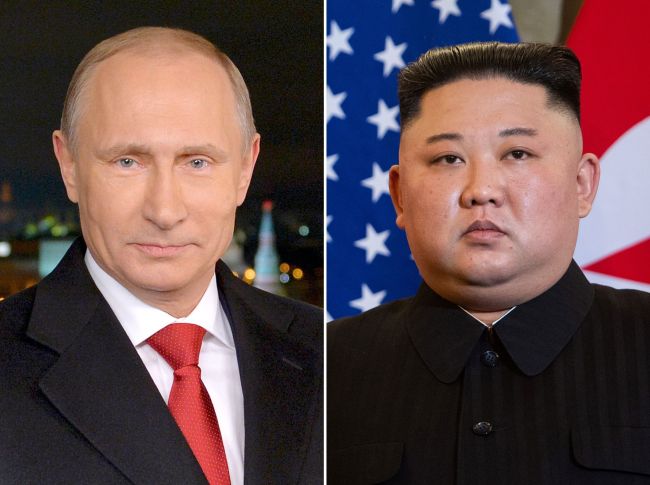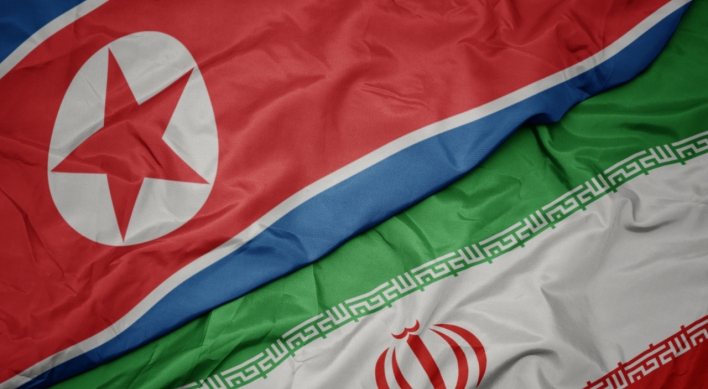Does NK turn to 'pendulum diplomacy' between China and Russia?
By YonhapPublished : April 19, 2019 - 13:51
North Korea appears to be embracing a delicate diplomacy between its major-power backers -- Russia and China -- as it prepares for a summit with Moscow amid stalled nuclear talks with Washington and less-than-expected support from Beijing.
The planned meeting between North Korean leader Kim Jong-un and Russian President Vladimir Putin harked back to the Cold War-era "pendulum diplomacy" that Pyongyang employed to swing between Moscow and Beijing to maximize its strategic interests.

The Kremlin has reportedly confirmed that Kim will visit Russia later this month for a summit with Putin. The date and venue for the summit has yet to be unveiled, but speculation persists that the leaders may meet in Russia's Far Eastern city of Vladivostok next week when Putin travels there en route to Beijing for an international forum.
The Kim-Putin summit, if realized, will come as the North Korean leader is striving to strengthen his hand in hitherto unfruitful nuclear negotiations with Washington and advance his pressing economic agenda under the straitjacket of international sanctions.
"Pyongyang is used to the pendulum diplomacy under which it carefully weighed which one would better support it, opted for one and put pressure on the other (not favorable to its interests)," Kim Heung-kyu, a professor of Chinese diplomacy at Ajou University, said.
Should the summit with Putin be held, Kim is expected to strive to secure another source of diplomatic leverage that could signal to both China and the United States that it has another partner to fall back on should the two countries eschew support for the impoverished state.
In recent weeks, Kim has been hammering away at the "self-reliance" mantra apparently to highlight that it can continue to endure the crippling sanctions that both the U.S. and China remain committed to.
Beijing has long been cited as Pyongyang's economic lifeline because China is known to account for 90 percent of the North's external trade.
Due to Beijing's sanctions enforcement, trade between the North and China dipped to US$2.43 billion last year, a decrease of more than 50 percent from the previous year, according to reports.
On the surface, Kim and Chinese President Xi Jinping have touted their close friendship and a "new chapter" in bilateral ties that have improved through their four rounds of summits, but tensions are still lingering, observers said.
Beijing has been in a difficult position to offer fulsome support for its cash-strapped ally, as it has been engaging in grueling trade talks with Washington that could impact Xi's drive to tackle a slowing economy if the negotiations go awry.
Washington has been pressuring Beijing to end such practices as forcing American firms to transfer technologies for access to the Chinese markets in what may amount to the theft of intellectual property and offering state subsidies to Chinese firms.
While China might seek to avoid a scenario where the North Korean issue hampers its trade negotiations, Pyongyang has been seeking to reduce its heavy reliance on Beijing in pursuit of diplomatic and economic autonomy, analysts said.
Against this backdrop, Putin may be able to use the summit with Kim to cement ties with the North, a disconnected node in Moscow's drive to expand economic cooperation across the peninsula and, by extension, into the wider Asia-Pacific.
Russia has been ramping up diplomacy in an apparent move to have a greater say in the shifting contours of geopolitics on the peninsula. The move is in line with its "New Eastern Policy," an initiative to cement ties with the Asia-Pacific, which is now a fulcrum of global power and wealth, and diversify its energy export routes.
Though Russia and China outwardly maintain good relations, Putin could also use the summit with Kim to undercut the growing influence of an increasingly assertive China on the peninsula and beyond, observers said.
"Though Russia and China are friendly countries, it is noteworthy that they are still rivals with both having recognized the strategic importance of the Korean Peninsula for a long time," said Park Won-gon, a professor of international politics at Handong Global University.
"China may thus feel a little apprehensive about the planned summit (between Kim and Putin)," he added.
Putin and Kim may be kindred spirits, some observers noted, as Russia has also been under international sanctions following its 2014 annexation of Crimea and under military pressure from the North Atlantic Treaty Organization's eastward expansion.
But some observers say that given that both Beijing and Moscow have been committed to promoting stability in the region when they already have their hands full with a slew of domestic issues, they might not let the North Korea issue strain their ties.
"Unlike the time of Cold War tensions, Russia and China maintain a considerably positive relationship for now, and I think there seem to be little benefits Russia may get by playing alone in Northeast Asia," Kim, of Ajou University, said. (Yonhap)



![[Exclusive] Korean military set to ban iPhones over 'security' concerns](http://res.heraldm.com/phpwas/restmb_idxmake.php?idx=644&simg=/content/image/2024/04/23/20240423050599_0.jpg&u=20240423183955)

![[Graphic News] 77% of young Koreans still financially dependent](http://res.heraldm.com/phpwas/restmb_idxmake.php?idx=644&simg=/content/image/2024/04/22/20240422050762_0.gif&u=)



![[Pressure points] Leggings in public: Fashion statement or social faux pas?](http://res.heraldm.com/phpwas/restmb_idxmake.php?idx=644&simg=/content/image/2024/04/23/20240423050669_0.jpg&u=)










